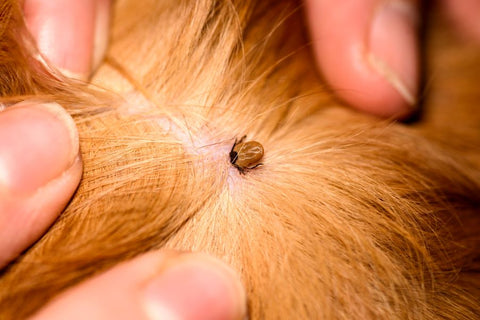

Key Highlights
- Homemade remedies are effective for treating fleas and ticks on pets
- Apple cider vinegar, citrus repellent, diatomaceous earth, garlic mix, cedar oil spray, neem oil, herbal flea spray, baking soda and salt treatment, rosemary flea control bath, and lavender essential oil are all natural remedies that work
- Regular cleaning, vacuuming, and preventive measures can help prevent future infestations
- Natural remedies are a preferred choice because they are safe for pets and free of harsh chemicals
- Treating both your pet and the environment is important for effective flea and tick control
- Professional help should be sought for severe infestations or persistent flea problems
Introduction
If you are a pet owner, dealing with fleas and ticks can be a constant concern. These parasites not only cause discomfort to your furry friends but also pose risks to their health. While there are many commercial products available for flea and tick control, homemade remedies can be just as effective, safer for pets, and more affordable. In this blog, we will explore 10 homemade remedies for fleas and ticks that actually work.
10 Effective Natural Remedies for Fleas and Ticks
Flea and tick infestations can be challenging to deal with, but there are effective natural remedies that can help. From apple cider vinegar spray to herbal flea powder, these homemade remedies can eliminate fleas and ticks without the use of harsh chemicals. Let's take a closer look at each of these remedies and how they can help combat flea and tick problems.
1. Apple Cider Vinegar Spray
Apple cider vinegar is a versatile natural remedy that can be used to repel fleas and ticks. The acidity of apple cider vinegar is unpleasant for these pests, making it an effective deterrent. To use apple cider vinegar as a spray, mix equal parts of apple cider vinegar and water in a spray bottle. Spray the mixture on your pet's coat, focusing on areas where fleas and ticks are commonly found, such as the neck, back, and tail. Additionally, you can spray apple cider vinegar on pet bedding to help eliminate flea eggs and larvae. Remember to avoid spraying near your pet's eyes and mouth.
- Apple cider vinegar is a natural flea repellent
- Mix equal parts apple cider vinegar and water in a spray bottle
- Spray the mixture on your pet's coat, avoiding the eyes and mouth
- Spray pet bedding to eliminate flea eggs and larvae
2. Citrus Repellent
Citrus fruits, such as lemons, have natural properties that repel fleas and ticks. You can create a citrus solution by slicing a lemon thinly and adding it to a pint of water. Bring the mixture to a boil and let it sit overnight. The next day, pour the citrus solution into a spray bottle. Spray the solution on infested areas in your home, such as sofas, pet bedding, and chairs. The strong scent of citrus will repel fleas and ticks. Additionally, you can use lemon juice diluted with water as a spray for your pet's coat. This will not only repel fleas and ticks but also help soothe itching and irritation. Citrus repellents are a natural and effective option for flea and tick control.
- Create a citrus solution by boiling lemon slices in water and letting it sit overnight
- Spray the solution on infested areas in your home
- Dilute lemon juice with water and spray it on your pet's coat
- Citrus repellents are natural and effective for fleas and ticks
3. Diatomaceous Earth
Diatomaceous earth is a natural and safe remedy for fleas and ticks. It is a fine powder made from the microscopic remains of fossilized algae. Diatomaceous earth works by dehydrating and killing fleas and ticks. Sprinkle diatomaceous earth on areas where fleas and ticks are present, such as pet bedding, carpets, and cracks in the floor. Leave the powder on for a few hours or overnight, then vacuum it up. Diatomaceous earth can also be used as a flea trap by placing it in a shallow dish with water. The fleas will be attracted to the diatomaceous earth and drown in the water. This natural remedy is effective for eliminating adult fleas and preventing infestations.
- Diatomaceous earth is a fine powder made from fossilized algae
- Sprinkle diatomaceous earth on areas with fleas and ticks
- Leave the powder on for a few hours or overnight, then vacuum it up
- Use diatomaceous earth as a flea trap by placing it in a dish with water
articlebanners1
4. Homemade Garlic Mix
Garlic has natural properties that repel fleas and ticks. You can make a homemade garlic mix to use as a spray for your pet's coat. Crush a few garlic cloves and steep them in hot water for about 15 minutes. Let the mixture cool, then strain it and pour it into a spray bottle. Spray the garlic mix on your pet's coat, focusing on areas where fleas and ticks are commonly found. This natural remedy is safe for pets and can help deter fleas and ticks. However, it's important to note that excessive garlic consumption can be harmful to pets, so use this remedy in moderation.
- Make a homemade garlic mix by steeping crushed garlic cloves in hot water
- Let the mixture cool, then strain it and pour it into a spray bottle
- Spray the garlic mix on your pet's coat
- Use this remedy in moderation to avoid excessive garlic consumption
5. Cedar Oil Spray
Cedar oil is a natural insect repellent that can help repel fleas and ticks. You can make a cedar oil spray by mixing a few drops of cedar oil with water in a spray bottle. Spray the mixture on your pet's coat, focusing on areas where fleas and ticks are commonly found. Cedar oil has a pleasant scent and is safe for pets. Additionally, you can use a flea comb soaked in cedar oil to comb through your pet's fur. This will help remove any existing fleas and prevent future infestations. Cedar oil spray is a natural and effective option for flea and tick control.
- Mix cedar oil with water in a spray bottle
- Spray the mixture on your pet's coat
- Use a flea comb soaked in cedar oil to comb through your pet's fur
- Cedar oil spray is a natural and effective option for fleas and ticks
6. Neem Oil
Neem oil is a natural flea repellent that can help eliminate fleas and ticks. You can apply neem oil directly to your pet's coat or dilute it with water and use it as a spray. Neem oil has insecticidal properties that repel fleas and ticks and can also help soothe itching and irritation. Additionally, you can treat pet beds and other areas where fleas and ticks are present by spraying them with neem oil. This natural remedy is safe for pets and can be used regularly to prevent infestations. Neem oil is an effective and natural option for flea and tick control.
- Apply neem oil directly to your pet's coat or dilute it with water and use it as a spray
- Treat pet beds and other areas with neem oil
- Neem oil repels fleas and ticks and soothes itching
- Use neem oil regularly to prevent infestations
7. Herbal Flea Spray
Herbs such as rosemary, rue, wormwood, fennel, and peppermint can be used to make an herbal flea spray. To make this natural flea remedy, place these herbs in a pestle and mortar and grind them into a powder. Add warm water to the powder and mix well. Pour the herbal flea powder into a spray bottle and spray it on areas where fleas are present, such as pet bedding, carpets, and furniture. This homemade flea spray is a safe and effective option for eliminating fleas and preventing infestations. Use this herbal flea spray as a natural home remedy for fleas.
- Grind rosemary, rue, wormwood, fennel, and peppermint into a powder
- Add warm water to the powder and mix well
- Pour the herbal flea powder into a spray bottle
- Spray the mixture on areas where fleas are present
8. Baking Soda and Salt Carpet Treatment
Baking soda and salt can be used as a natural treatment for fleas in carpets. Sprinkle a mixture of baking soda and salt on your carpets, focusing on areas where fleas are present. Use a hard brush to rub the mixture into the carpet fibers, ensuring that it reaches the flea larvae and eggs. Leave the mixture on the carpet for a few hours or overnight, then vacuum it up. Baking soda and salt help dehydrate and kill fleas and their eggs, making it an effective home remedy for flea control. Regular use of this treatment can help prevent reinfestation and keep your carpets flea-free.
- Sprinkle a mixture of baking soda and salt on your carpets
- Use a hard brush to rub the mixture into the carpet fibers
- Leave the mixture on the carpet for a few hours or overnight
- Vacuum the mixture to remove fleas and their eggs from the carpet
9. Rosemary Flea Control Bath
A rosemary flea control bath is a natural and soothing way to treat flea infestations on your pet. Steep fresh rosemary leaves in boiling water, then strain the mixture and dilute it with warm water. When the water reaches a comfortable temperature, pour it over your pet's coat and let it soak for a few minutes. This will help kill fleas and soothe itching and irritation. After the bath, rinse your pet thoroughly with clean water to remove any remaining rosemary residue. Regular rosemary flea control baths can help keep your pet free of fleas and provide relief from flea infestations.
- Steep rosemary leaves in boiling water and dilute with warm water
- Pour the mixture over your pet's coat and let it soak
- Rinse your pet thoroughly with clean water after the bath
- Rosemary flea control baths provide relief from flea infestations
10. Lavender Essential Oil
Lavender essential oil is a natural flea repellent that can be used to eliminate fleas and prevent infestations. You can apply lavender essential oil directly to your pet's coat or dilute it with water and use it as a spray. Lavender oil has a pleasant scent and is safe for pets. It repels fleas and other insects, making it an effective flea control option. Additionally, you can use lavender essential oil to treat infested areas in your home, such as pet bedding, carpets, and furniture. This natural remedy is safe and easy to use for flea and tick control.
- Apply lavender essential oil directly to your pet's coat or dilute it with water and use it as a spray
- Lavender oil repels fleas and other insects
- Use lavender essential oil to treat infested areas in your home
- Lavender oil is a safe and effective option for flea and tick control
articlebanners2
Preventing Future Infestations
While homemade remedies can help eliminate fleas and ticks, taking preventive measures is essential to avoid future infestations. Regular cleaning and vacuuming can help remove flea eggs and larvae from your home. Use a flea comb to check your pet for fleas and ticks regularly. Avoid areas with high flea activity, such as wooded areas or tall grass. Taking these preventive measures can help keep your home and pets flea-free.
Regular Cleaning and Vacuuming
Regular cleaning and vacuuming are important for preventing flea infestations. Vacuum your home thoroughly, paying attention to areas where fleas are likely to hide, such as carpets, rugs, and pet bedding. Vacuuming not only removes adult fleas but also helps eliminate flea eggs and larvae. After vacuuming, empty the vacuum bag or canister outside to prevent fleas from reinfesting your home. Additionally, wash pet bedding regularly in hot water to kill any fleas or eggs that may be present. Regular cleaning and vacuuming are effective measures for preventing flea infestations and keeping your home flea-free.
Natural Preventive Measures for Pets
Using natural flea repellents and preventive measures for your pets can help keep them flea-free. There are various natural options available, such as using a flea comb to remove fleas and their eggs from your pet's coat. You can also use natural flea repellent sprays made with ingredients like tea tree oil or essential oils. Regularly washing and treating pet bedding with natural flea remedies can also help prevent infestations. Natural preventive measures are safe and effective for keeping your pets free from fleas and ticks.
Keeping Your Yard Flea and Tick Free
Maintaining your yard is essential for preventing flea and tick infestations. Regularly mow the lawn and remove tall grass, weeds, and debris, as these are breeding grounds for fleas and ticks. Trim shrubs and bushes to reduce flea activity. Consider using flea traps in your yard, which can help capture and eliminate fleas. Avoid creating areas of standing water, as these can attract fleas and mosquitoes. Taking these yard maintenance measures can help keep your outdoor space flea and tick-free.
Why Natural Remedies Are a Preferred Choice
Natural remedies are a preferred choice for flea and tick control for several reasons. Firstly, they are safe for pets, as they do not contain harsh chemicals that can be harmful to their health. Natural options also provide effective results without the need for strong pesticides or toxins. Additionally, natural remedies are often more affordable and readily available compared to commercial products. If you have a flea problem, exploring natural remedies can be a safe and effective solution.
The Importance of Treating Both Your Pet and Environment
Treating both your pet and the environment is crucial for effective flea and tick control. Fleas can easily infest your pet's bedding, carpets, and furniture, laying eggs and continuing the life cycle. By treating your pet and the environment simultaneously, you can break the flea life cycle and prevent reinfestation. Regularly wash and treat pet bedding, vacuum carpets and furniture, and use natural remedies in infested areas. This comprehensive approach ensures that both your pet and the environment are free from fleas and ticks.
When to Seek Professional Help
While homemade remedies can be effective, there may be instances where professional help is needed. If you have a severe flea infestation that persists despite your efforts, it may be time to seek professional pest control services. Professionals have the knowledge and resources to effectively eliminate fleas and ticks from your home and provide long-term solutions. Additionally, if you have a persistent flea problem that is impacting the well-being of your pets, professional help can ensure that the issue is addressed thoroughly. Don't hesitate to reach out for professional assistance if you are facing a challenging flea problem.
Frequently Asked Questions
What Makes These Remedies Effective Against Fleas and Ticks?
These homemade remedies are effective against fleas and ticks due to their natural properties. Ingredients like essential oils and natural flea repellents repel fleas and ticks. They also target different stages of the flea lifecycle, including flea eggs, larvae, and adults, helping to eliminate infestations.
How Often Should I Use These Natural Remedies?
For best results, it is recommended to use these natural remedies regularly. Fleas have a life cycle that includes different stages, so regular use of these remedies can help break the cycle and prevent infestations. Use the remedies as directed and continue treatment until the flea problem is resolved.
Can These Remedies Be Used on All Pets?
While these remedies are generally safe for pets, it's important to consider your pet's specific needs and sensitivities. Some pets may have allergies or sensitive skin that can react to certain ingredients, such as essential oils. Always monitor your pet's reaction and consult with a veterinarian if you have any concerns.
Are There Any Precautions to Take While Using Homemade Remedies?
When using homemade remedies, it's important to follow the instructions and use them safely. Monitor your pet for any signs of allergic reactions or skin irritations. If your pet has sensitive skin or any underlying health conditions, it's a good idea to consult with a veterinarian before using these remedies.
How Long Does it Take to See Results With These Natural Treatments?
The duration of treatment can vary depending on the severity of the flea infestation and the specific remedy used. While some remedies may provide immediate relief, it may take longer to completely eliminate the infestation. Consistent and regular use of these natural treatments is key to achieving long-term results.
articlebanners3



